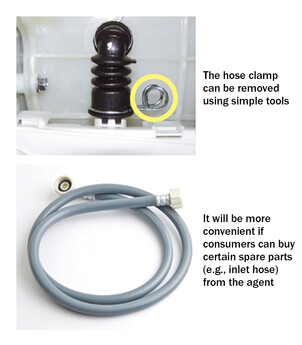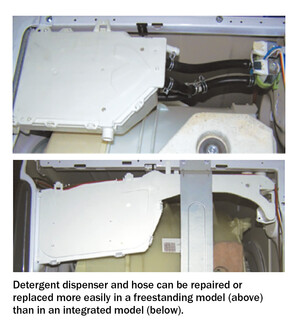5 ways to take good care of your washing machine
Do not overload
When the washing machine spins, the wet clothes in the drum will generate a strong centrifugal force. If you overload the machine, the drum will vibrate strongly, making the mechanical parts more prone to damage. Sundries such as coins and keys should also be removed before washing.
Lower the spinning speed
If the spinning speed is adjustable and time permits, it is recommended to set the spinning speed to < 1,200 rpm to reduce the chance of mechanical damage and wear and tear on clothes. At the same time, it is best to wash clothes at a lower temperature setting. If there are no children at home, the door of the washing machine should be left open after washing to prevent moisture build-up.
Do not use laundry detergent spontaneously
You should read the instructions on the packaging to determine the appropriate amount of laundry detergent to be used. Avoid using excessive amount to prevent foam build-up which may affect the operation of the machine. In addition, the detergent compartment should also be cleaned regularly to avoid the accumulation of chemical agents and affecting the operation.
It is worth noting that some tests have showed that laundry liquid is easier to dissolve than powder and can deliver a better cleaning performance. It is also less harsh on the fabrics and leaves less residues on the drum.
Clean the filter and drum regularly
You should remove the small fibres caught on the lint filter regularly to prevent blockage of the drain hose. Furthermore, after the washing machine has been used for a period of time, dirt and residual detergent will build up in the hard-to-reach areas of the drum and may affect the cleaning performance of the machine. Some washing machines have a "drum cleaning" programme. Consumers can follow the instructions in the user’s manual and run it at least once a month. Some instructions recommend adding washing machine drum cleaner (which is available in household stores or supermarkets) to enhance the cleaning effect. Even if the washing machine does not have a "drum cleaning" programme, consumers can still clean the drum by regularly running a wash cycle at a high-temperature setting (if available) with an empty drum (i.e., without any clothes and detergent).
Check the door and hose regularly
You should check the rubber gasket of a front-loading washing machine regularly and remove any dust and debris that have been built up. If the washing machine takes longer than usual to fill up with water, you should check if the inlet hose and the filter are blocked.
Manufacturers should design products that are easy to carry out repair and maintenance
No matter how durable it is, a washing machine may still break down after years of usage. If the machine can be easily repaired, it will help in extending its useful life. For example, a design that enables easy removal of the outer casing and replacement of the faulty parts without the need of special tools; or a more flexible freestanding design that allows the detergent dispenser / hose to be removed more easily.


Furthermore, according to a survey conducted by the Council, a few respondents indicated that they had experienced problems with the preset programmes of their washing machines / washer-dryers, reflecting that although smart functions make the operation more convenient, they may also affect the durability of the machines.
Pay attention to after-sales service
With comprehensive after-sales services, consumers will be more willing to repair their washing machines, which will help prolong the machines’ useful lives and reduce burden on the landfill. However, consumers should pay attention to the details of after-sales services to avoid potential disputes:
1. Time limit on free replacement | If the new washing machine breaks down immediately after purchase, many brands will provide free replacement within a specified time limit after verification by a repairman. However, it should be noted that the validity period of some brands can be as short as 7 days from the date of purchase. If the delivery and installation take time, this deadline may be missed when the machine is turned on for the first time. Therefore, consumers should pay attention to this issue. |
2. Pay attention to the definition of ‘whole machine warranty’ | The definition of ‘whole machine’ in the warranty generally does not cover the outer casing, door, rubber gasket, hose and problems caused by installation. Therefore, damages to the body and door, or problems caused by improper installation are usually not covered by the warranty. Consumers should check the scope of the warranty before purchasing. |
3. Onsite inspection fee | If consumers live in remote areas, outlying islands or restricted areas, they usually have to pay onsite inspection fees, transportation costs, or have the machines sent to designated sites for repair.
|
4. Commitment on repair and maintenance | When a new model is introduced, older models and their spare parts will gradually discontinue. Consumers may be forced to discard a faulty machine due to lack of parts. Consumers should pay attention to whether the brand has relevant policies to ensure continual maintenance 5 to 10 years after the product is launched and supply of spare parts for say 3 to 10 years after the product is discontinued. |
The Producer Responsibility Scheme on Waste Electrical and Electronic Equipment
If consumers need to dispose of their old washing machines, they may make good use of the Producer Responsibility Scheme on Waste Electrical and Electronic Equipment (WPRS) by calling the recycling hotline of the Environmental Protection Department (EPD). WPRS covers 8 types of regulated electrical equipment (REE) including washing machines, refrigerators, televisions, air-conditioners, computers, printers, scanners and monitors, which account for approximately 85% of all electrical and electronic products in Hong Kong. These products contain chemical substances and heavy metals. If discarded or disassembled improperly, they may put the public and recycling workers at risk. Therefore, the EPD has set up a hotline (2676 8888) for the free recycling of REE. The public can call and book the recycling service. This service covers Hong Kong, Kowloon and the New Territories. Even if you live on the top floor of a tenement building, or in a remote or rural area, you can still use this service.
For more information, please refer to special feature ‘Maintenance of Washing Machines’ (Chinese version only) in issue #472 of CHOICE Magazine.
Further reading: How to choose a washing machine
Front-loading type, European top-loading type or impeller-type? Which washing machine is the best in terms of water and energy saving? Is there always a trade-off between water and energy saving? To answer these questions, you can refer to the article ‘Washing Machines: Can They Save Water and Energy At the Same Time?’
Further reading: Do you need to use fabric softener in every wash?
Many consumers like to use fabric softener to make their clothes soft and fragrant. However, do you know that fabric softener should not be used on certain fabrics. In dry seasons, clothes with fabric softeners may cause allergies. To learn more on fabric softener, please refer to the article ‘Trivia Facts About Fabric Softener: Suitable for All Clothing? Can you DIY?’ (Chinese version only).







![[Baby Snacks Guide] Who Says Snacks Can’t Be Healthy?](/f/guide_detail/415742/376c212/bb%20snack.jpg)



